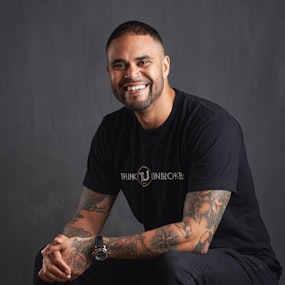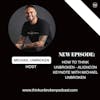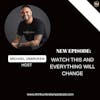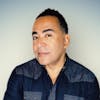Why I FIRED my Therapist
In today's candid and deeply personal discussion, I delve into the decision of parting ways with my therapist and the empowering journey that followed... See show notes at: https://www.thinkunbrokenpodcast.com/why-i-fired-my-therapist/#show-notes
In today's candid and deeply personal discussion, I delve into the decision of parting ways with my therapist and the empowering journey that followed. Throughout this thought-provoking episode, you'll gain invaluable insights into the importance of establishing a strong therapist-client relationship and recognizing the signs that it may be time for a change.
As you listen to my empowering story, you'll discover a renewed sense of empowerment to take charge of your own mental well-being. Whether you've experienced similar struggles or are simply curious about the dynamics of the therapeutic process, this episode offers invaluable wisdom for anyone on a journey of self-discovery and healing.
Tune in now to unlock a wealth of inspiration and encouragement to embrace change, foster personal growth, and embark on a path towards greater mental and emotional well-being. Don't forget to hit that 'Subscribe' button and 'Like' this episode if you found it helpful. Let's spread the power of self-empowerment together!
************* LINKS & RESOURCES *************
Learn how to heal and overcome childhood trauma, narcissistic abuse, ptsd, cptsd, higher ACE scores, anxiety, depression, and mental health issues and illness. Learn tools that therapists, trauma coaches, mindset leaders, neuroscientists, and researchers use to help people heal and recover from mental health problems. Discover real and practical advice and guidance for how to understand and overcome childhood trauma, abuse, and narc abuse mental trauma. Heal your body and mind, stop limiting beliefs, end self-sabotage, and become the HERO of your own story.
Join our FREE COMMUNITY as a member of the Unbroken Nation: https://www.thinkunbrokenacademy.com/share/AEGok414shubQSzq?utm_source=manual
Download the first three chapters of the Award-Winning Book Think Unbroken: Understanding and Overcoming Childhood Trauma: https://book.thinkunbroken.com/
Join the Think Unbroken Trauma Transformation Course: https://coaching.thinkunbroken.com/
@Michael Unbroken: https://www.instagram.com/michaelunbroken/
Follow us on TikTok: https://www.tiktok.com/@michaelunbroken
Learn more at https://www.thinkunbrokenpodcast.com
Support this podcast at — https://redcircle.com/think-unbroken-with-michael-unbroken-childhood-trauma-cptsd-and/exclusive-content
Support the Podcast: Become a listed sponsor!
Follow me on Instagram @MichaelUnbroken
Learn more about coaching at https://coaching.thinkunbroken.com
Get your FREE copy of my #1 Best-Selling Book Think Unbroken: https://book.thinkunbroken.com/
Hey, what's up my friends? I hope that you're doing well, I'll be honest, I'll lead into this with truth. The title of this episode is a little clickbait, but I did that intentionally.
A lot of time when I'm in this journey whether I'm being on podcast or whatever, people always ask me like, how do I approach and handle therapy? I've been very upfront and honest about this for a long time, I spent a tremendous amount of time, effort, energy, and money and therapy, especially in the first probably six or seven years of this journey where I was going to therapy constantly. Now I don't go constantly and instead I go like, as needed and it's become more of an acute remedy than something chronic that I'm dealing with.
So, recently I went to go and find a new therapist. The man I've worked with for years is f*cking incredible, like absolutely amazing human being. But you know, it got me thinking like even in the way that I view coaching and the way that I view the clients who come into coaching with me, eventually you have to learn from other people. And over the course of the last, I guess, probably four years, I've spent a lot of time self-coaching where effectively what I'm doing is trying to answer and solve the riddles of the questions and puzzles of my head within myself based on the data, information, and evidence that I have while kind of balancing those against the future and just looking at it and asking myself future-based retrospectively, what would I tell the version of me now in the future? Like if I was in the future, if I was 80 years old me, what would I tell me today? If I was 60-year-old me, 40 year old me, right? What would I tell me today? Even though I'm almost 40, it's getting closer every day, and so I've spent a lot of time in this self-coaching structure.
One of the things that I decided to do recently was to go and find a new therapist because I was dealing with a problem that I had never dealt with before, and some things had come up and I was like, okay, I need some input here. I need input from a third party someone who actually doesn't even necessarily know my story or my background, but knows enough, or I can give them enough context to allow them the space to not help me make a decision, but help me qualify the decisions I had in my head for the best potential outcome, that's the way that I would phrase that. I think we all as individuals need to make our own decisions. But input and data can help. And having someone experienced, you know, be it a coach, a therapist, mentor, whatever. I mean, that's the same reason I have coaches and mentors and therapists 'cause I'm like, here's my problem. These are the things that I've extrapolated as potential solutions for this problem and what can I do?
So why did I make this a clickbait title? I fired my therapist. Here's what happened. So about a month ago, I made a decision to go find this new therapist. I did the same thing I did before where I just started reaching out to tons of different therapists, asking them about their qualifications, their backgrounds, their story, their journey, their experiences, so on and so forth.
I end up going to meet one person, in person after having kind of this prequalification conversation with them and their team and kind of getting some insight and feedback on their story, their journey, all the things. And I'm sitting in there and I look at him, I go, one of the things, 'cause look, at the end of the day, guys know thyself is the cornerstone to this entire journey. So, I'm sitting in here, I'm having this conversation with this guy, and I say to him, I know myself so incredibly well that I probably actually already have the answer and what I sometimes do when I'm in rooms like this is I'm looking for both justification which is a weird way to phrase it, but I'm looking for both justification and in some weird way, permission, even though it's counter to most of the way that I operate my life. Sometimes when I hit these gigantic barriers or these huge problems, things I've never dealt with, or things come that I've never been approached with, and I know that someone's experienced them, I'm looking for the shortcut. Right. So that's how I approach it. I say this to him and I'm like, look, dude, here's the reality. I probably already know what to do. I just want to hear what you have to say about this. I think that's what coaching, like we all know what to do.
Every single one of us, like internally, I know with certainty I know what to do. Most of us just don't do it. Right? Let's call it what it's just true. And so I'm sitting here, I have the conversation with him. I go through what it is that I'm wanting to do, and I tell him, I say, before you answer this question for me. And look, I put people on the spot because I think it's really incredibly important that we have clarity about people, their intentions, their backgrounds, their what it is that you expect from them. And so, I look at him and this is the exact words I say, why should I ever take advice from you about the thing that I just said? I was just very, very blunt about it, and I do that frequently. I said, why should I ever take advice from you about the thing that I just said that I need input on? What do you think that you bring to the table? Which honestly, it's not a question to throw people off guard. It's not even a question to like put a wall up. It's just like, where are you at? Because if I drop something heavy in the context of my life, my story, my journey, where I'm at today, what I need, where I'm going, whatever that is, and like, you can't, lemme tell you what he said.
So, he sits across from me and he looks at me and just plain as day, he just goes, you know, I think I'm an okay therapist. He goes, I'm just, you know, I'm okay. I'm okay, I like to do this. It pays the bill and then he says it pays the bills. He goes, I'm okay. And immediately I said, all right, I'm sorry, but you can't help me. And I could tell he kinda shifted, but I'm gonna tell you why I said that and I told him why I said it I'm sharing it here. Look, maybe it's a off day for him, maybe he just truly believes, he's just simply okay. But I look at our lives and I look at people who have come through traumatic experiences and through the scope of my own journey, I don't want okay, I don't want mediocre. I don't want just enough. I don't want good enough. I don't want, well, that covers the basis. If he would've sat across from me and said, Michael, I'm the best f*cking therapist in the country. I'd have been like, you got me. You got me. Why? Because there's a level of confidence in that, in which I can trust that this person who's coming across to me believes in the words that they're saying to me. Because it's like, how do you take advice from someone who doesn't believe in themselves enough to be like, they're great? And look, I get the thing about humility and being humble. I understand that, I also think it's bullshit, like straight up between you and me. I think being humble is nonsense. I think it's something that most people do to stuff down their greatness because they've been told that if they shine, they're gonna get other people dirty and I just think it's nonsensical. And so, I'm sitting across from him and he says, I think I'm an okay therapist, and my first reaction was absolutely not, just, no, I'm not going to do this with you because I need more than, okay, I need conviction. I need truth. I need power. I need constitution. I need a guy who, or girl, whoever it happens to be, who's sitting across from me to just be like, I will help you solve this f*cking problem.
The thing that I tell my clients when we come together and they decide to join coaching programs, whether it's a Monday coaching, one-on-one coaching events, whatever, here's the one thing I say to them, if you commit to this program, I am committed to you and I refuse to let you fail. And so many people get in connection with therapists, with coaches, with mentors who are just like they believe that they're okay. And so, they get okay results. I believe that I'm the best trauma coach in the entire f*cking world, period. There’re videos of it on my website, go to thinkunbroken.com. Watch some of the testimonials. I did not say this. P eople have compared me to Tony Robbins, to Brendon Burchard, to some of the greatest minds in the world. And guys, I tell you the truth, it's because I have conviction. I am so studious about this. I have lived it. I have walked it. I have breathed it. I mean, I have helped people obviously, at the end of the day, people help themselves, but I have laid out the framework for thousands of people, and I believe I am the best. I don't think anyone's better than me. Period. That's not hubris. That's not me saying that there aren't 'cause I know there are people better than me, right? Like in a logical sense, the guy who's been doing it for 15 years is better than the guy who's been doing it for eight, that's just the way it goes, right? I'm not gonna argue that.
The person who they spoke on more stages than me, they're better, right? I understand that like from a logical, analytical perspective, but from a mental, emotional, experiential perspective, like looking at my life and what it is that I do, I believe I'm the best. And I always tell you guys, if you don't believe in yourself, who will?
And so, sitting across from him, he says, I think I'm an okay therapist. He didn't even say, I believe. He just, I think, I guess maybe, possibly. And I'm like, absolutely not. And on the spot, I looked at him, I go, dude, you can't help me. This has nothing to do with you. I'm sure you're an amazing human being. You know, I appreciate the time, but I cannot step into mediocrity with someone. And like the first call to it was, and this is not me berating the guy. I promise you it's not. But I just looked at the environment of the office and I thought to myself, this is someone who wasn't on the next level. Now, why did I decide to walk away from this guy? And the moment before he even gave me a single inkling of advice because I knew, I knew when I walked away and he said, do you feel like you want to come back? And I go, maybe, but probably not. I'll put something on the books just in case 'cause I always like to go home and I like to like, think things through and because I don't wanna make rash emotional decisions. Right. And I was in an emotional place a month ago trying to navigate this thing.
And I got home just a short bit later and I was like, no, I'm good. I'm good because even though I told him, look, we're always gonna be in conflict with ourselves like this is just the nature of the human experience and it's just seeing through it's about following through on your gut and your intuition, trusting what you say, what you feel, what you believe is correct, and then not second guessing yourself because of an emotion that gets tied into your decision making, which shapes your rationale, if that makes sense. So, looking at this, I apply this concept in this theory about everything in my life where it's like, why would you want to just only be okay? Work with someone okay? Learn from someone okay? Why would you not want more than that? And so, I've effectively fired this guy and I looked at him, I was like, dude, I get it, but you can't help me 'cause I don't want an okay life. I don't want a mediocre life. And I'm sure, again, that this specific person is great and maybe the person you are working with is great. But maybe they're just okay, but maybe they're also not for you. And so, I made a decision to keep heading down this path and this journey.
When I found the last therapist that I worked with, who I've worked with for years and years and years, the guy Daniel, who really, really, really changed my life like that dude was beyond okay, that dude, like I would argue he's the best therapist in America. Actually, I would point a lot of fingers to point to the fact that he was the best therapist in America. But again, you cap out, you level out and eventually you're kinda like, yeah, I get it. I think we've our time together has run its course.
And as I continue to head forward and I'm thinking about what's next in the people that I wanna work with and the context of the human I want to build my life around, it's really about not accepting less than greatness. And I know that's a weird thing and people might be hearing this. I'm like, what? Like what are wouldn't you just want the help? And I'm like, you have to know that the source is both viable and like I think the source has to be both viable and it has to be a source that you're like, I would bet the farm on this. Right. You have to be so willing to because people are informing you. It's even like when people come to coaching with me, the one thing I always tell them is like, I'm not gonna be able to help you, but I am gonna lay out the framework. I am gonna be here to answer your questions. I am gonna be here to support you. I am gonna be here to do, but I can't help you make the decisions every day. I can just plant seeds in your head. And so, like, think about this if you're in a trauma healing journey, your life's at rock bottom right now. You're like, man, my life really sucks.
Let's paint a picture. Let's say your life is where my life when, when I was 25. You are obese. You're smoking every day. You're drinking every day. You're in a horrible relationship. Your friendships are garbage. Your money is garbage. Your health is garbage. Your car doesn't work. It got repoed. Your family doesn't talk to you. You're suicidal. You're heading down this crazy path. Okay, cool. Why would you learn from someone? Why would you ever go get a coach who was like, yeah, I'm okay. I could maybe help you with this. Your life is in dire straits, okay is not gonna get you to the next level. Right? And so that's the rationale that I think about where I'm like, when people come and learn from me and step into Think Unbroken, or listen to this show, the thing that I'm always thinking about is am I giving them my greatest constantly? And look, eight years into doing this, almost 700 podcasts, I will tell you right now, it's not always the greatest because I have off days like everybody, but outside of those very small periods of time where it's like I'm having an off day, like I go a hundred percent, because I think that's the thing that matters like am I showing up as fully as humanly possible to be of service to people knowing that okay, and mediocrity is not going to get them to the next level because, okay and mediocrity has probably got you to where you are. And I'm like, if I was 25 years old and I sat across from me at 38, would 38-year-old me be able to help 25-year-old me? And the answer is unequivocally, absolutely no questions asked. Right? And I think about why. Well, because I've refused to settle. I've refused mediocrity. I've refused to be okay. Right. And okay being like the framework of the scale of, I guess it's the framework of the scale of viability really. Right? If per, okay, good, great, proficient, excellent, phenomenal. Like, I don't know, I'd have to like literally write down the scale, but like okays, like at the bottom. Like, okay, is like just enough. Like I could probably barrel minimum help you, like that's not gonna benefit anyone.
And so, as I walked outta that office and I came back home and I just reflected on it, I was like, nope, not my person 'cause the person and the people in my life, whether they are a coach or a therapist, or a romantic partner, or my friends or my community, the people who feed into me on the day-to-day basis, there's no mediocrity in them, they're all striving, they're all pushing. And this isn't to say people don't have bad days or off days or suck or make mistakes sometimes 'cause like, yes, obviously, right? I'm never gonna be like everybody's perfect. But what I am saying is like you cannot settle for just enough, not in this journey, not in this life, not in this thing that we're trying to create today. Because the moment you start to settle, it's going to be a reflection of your life and if you've settled for all of your life into this moment, and you're taking a look at your environment and your money, and your health, and your wealth and your friendships and your relationships and your community, and they're all just kind of like mediocre, like if they're all mediocre, well, guess what? Mediocrity is there because you've allowed okay, to be the decision-making mechanism for which you have allowability into the things that you're trying to do in your life. Yeah, it's okay, but it's not.
And so, as I pursue to continue to move forward in my journey, and I'm like, okay, what's next? What do, what's the next roadblock? What is the thing I'm learning from? What is the thing I cannot self-coach through? The only people that can help me are the people who, and again, I get that the framework of this can sound a little bit strange, but I hope that it's made sense because I know that the people that can help me are the people who also believe that they're the greatest, it's subjective, right? Obviously, it's not objective, there's no number one therapist, there's no number one coach, there's a lot of self-proclaimed I self-proclaim, right? Because you have to believe that. I do believe that you have to believe that. But ultimately, the thing that I just keep coming back to with really intense conviction is this idea that okay, will leave you where you are and only greatness will push you to the next level. And so, you wanna work with great people. You wanna work with people who have been where you are. You do not wanna work with people who self-proclaim okayness. You just don't, I mean, I'm not saying that that person maybe didn't have a bad day or that there's not a scope in which they could help me better than maybe anyone ever. But as you're sitting across from someone in your moment of need, like, okay, one more context, just 'cause this came to mind.
You're in the emergency room, you cut your arm open and the doctor comes in and he looks at you and he goes, I can stitch you up, but it's probably just gonna be okay, it won't heal very well, it will leave a horrible scar. You may even bleed out. It's gonna hurt really bad 'cause I suck at it like, are you gonna feel confident that that doctor can help you? Whereas if you walk into the ER and you've cut your arm open and the doctor looks at it and goes, I've done this 10,000 times, this will take 37 seconds, it's gonna hurt a little bit, but it'll stop bleeding, it won't get infected, you'll have no scarring, we'll have you out the door before you know it. There's a vast difference there, right?
So, I just want you to think about that as you go through what's next in life and the people you're connecting with, and the people that you're learning from. Remove okayness from your life and seek greatness.
All right, my friends. Thank you, guys, for being here.
Reminder, you can get a free copy of my book, Think Unbroken.
I send you the book with shipping, a hundred percent paid by me. If you go to book.thinkunbroken.com, the exchanges, you give me your email address and your emailing address so I can send it to you or you can just go to Amazon and buy it, whatever you want, that said, my friends, thank you for being here. I appreciate you.
And Until Next Time.
Be Unbroken.
I'll See Ya.

Michael Unbroken
Coach
Michael is an entrepreneur, best-selling author, speaker, coach, and advocate for adult survivors of childhood trauma.
Welcome to The Think Unbroken Podcast!
Here are some of my favorite recent guests!

































































